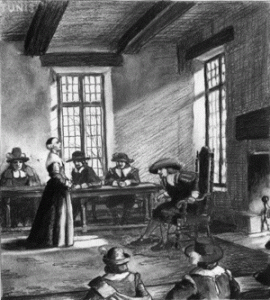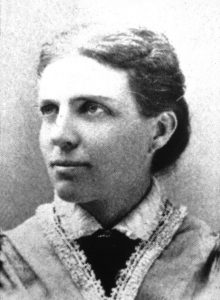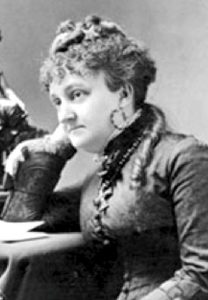Three women — a Catholic, a Methodist and a Baptist — stepped up to the bar.
The bar was not “The Idle Hour,” “Joe’s Bar & Grill” or any liquor establishment. It was the bar of law before which legal cases are argued. Even if March were not Women’s History Month, we ought to remember and honor three remarkable women who stepped up to that bar: Margaret Brent (1601-1671), Arabella Mansfield (1846-1911) and Myra Bradwell (1831-1894).

Margaret Brent
The Catholic was Margaret Brent. In 1638, Margaret, a sister and two brothers immigrated from England to colonial Maryland where they acquired large land grants. Because she remained single throughout her life, Margaret was able to retain ownership and management of her own property, becoming the first woman in Maryland to do so.
She defended her rights in court, representing herself and others in 124 court cases, all of which she won. She even appeared as de-facto attorney for Maryland’s first proprietary governor, Leonard Calvert, and was executor for his estate.
Today the American Bar Association honors her with its annual Margaret Brent Women Lawyers of Achievement award.

Arabella Mansfield, the first female lawyer admitted to practice in the United States. (Archives and Special Collections of DePauw University)
The Methodist was Arabella (Babb) Mansfield. Born near Burlington, Iowa, Arabella graduated from Iowa Wesleyan College and taught at what is now Simpson College in Des Moines, Iowa. She and her husband, John Mansfield, studied law at her brother’s law office, and in June 1869 they both took and passed the Iowa state bar exam.
John and Arabella Mansfield applied at the same time for admission to the bar. While he was admitted, she was not, as Iowa law only allowed admission for “any white male person.”
Arabella challenged that law before District Court Judge Francis Springer. Judge Springer ruled that “the affirmative declaration that male persons may be admitted is not a denial of the right of females.” He approved her application and on same day licensed her to practice law. In 1870 Iowa’s Supreme Court allowed Springer’s decision to stand. The Iowa Legislature then amended the statute by dropping the words “white male.”
Rather than enter law practice, Arabella Mansfield continued to teach, worked for women’s suffrage and helped establish the Iowa Woman Suffrage Society.

Myra (Colby) Bradwell
The Baptist was Myra (Colby) Bradwell. Born in Manchester, Vt., she lived her childhood in New York, Illinois and Racine, Wis. She married James Bradwell and after several years in Memphis, Tenn., the couple settled in Chicago. James opened a law office, and Myra studied law while assisting in his practice. In 1868 she founded the Chicago Legal News, a weekly newspaper that became an influential legal publication.
Myra Bradwell helped write the Illinois Married Women’s Property Act (1861) and the Earnings Act (1869) giving married women in Illinois control over their own income and property. In 1869, Myra became the first woman to pass the Illinois state bar examination. The Illinois Supreme Court, however, denied her a license to practice law on the grounds that a contract exists between lawyers and their clients. U.S. law was based on English common law. Sir William Blackstone’s 1765 Commentaries on the Laws of England had famously stated: “By marriage, the husband and wife are one person in law: that is, the very being or legal existence of the woman is suspended during the marriage.” Since Myra was a married woman, she was deemed incapable of establishing or being bound by any contract.
When Myra reapplied in 1870, the Illinois Supreme Court again rejected her not only because of her marital status but also due to her gender. In the words of Chief Justice Charles B. Lawrence, “God designed the sexes to occupy different spheres of action.”
Myra then appealed to the U.S. Supreme Court. Her lawyers argued Illinois had violated Bradwell’s rights under the 14th Amendment. The Court admitted that Myra was both qualified and of good character, but by an 8-1 opinion upheld Illinois’ right to regulate the granting of licenses within its borders.
“The natural and proper timidity and delicacy which belongs to the female sex evidently unfits it for many of the occupations of civil life.”
Supreme Court Justice Joseph P. Bradley wrote a concurring opinion supported by two other justices that opined beyond states’ rights and addressed women’s rights. Bradley echoed Blackwell that a married woman had no existence under law separate from her husband. He wrote that “the civil law, as well as nature herself, has always recognized a wide difference in the respective spheres and destinies of man and woman. Man is, or should be, woman’s protector and defender. The natural and proper timidity and delicacy which belongs to the female sex evidently unfits it for many of the occupations of civil life. The constitution of the family organization, which is founded in the divine ordinance as well as in the nature of things, indicates the domestic sphere as that which properly belongs to the domain and functions of womanhood. … It is true that many women are unmarried and not affected by any of the duties, complications and incapacities arising out of the married state, but these are exceptions to the general rule. The paramount destiny and mission of woman are to fulfill the noble and benign offices of wife and mother. This is the law of the Creator. And the rules of civil society must be adapted to the general constitution of things and cannot be based upon exceptional cases.”
In 1879, the U.S. Congress passed a bill allowing women to practice law in federal courts. Eleven years later, the Illinois Supreme Court finally approved Myra Bradwell’s original application and symbolically post-dated her admission to the state bar as having occurred in 1869.
Although she never practiced law, Myra Bradwell had joined Margaret Brent and Arabella Mansfield, any one of whom could arguably be called “America’s first woman lawyer.”
Three women — a Catholic, a Methodist and a Baptist — stepped up to the bar. And made history.

Reid Trulson
Reid S. Trulson is the retired executive director/CEO of International Ministries. He previously served as the American Baptist representative to Europe in Austria and the Czech Republic, area director for Europe and the Middle East, Scripture Union regional secretary in Ghana, and as an American Baptist pastor in California and Wisconsin. He is the author of Charlotte Atlee White Rowe: The Story of America’s First Appointed Woman Missionary.


